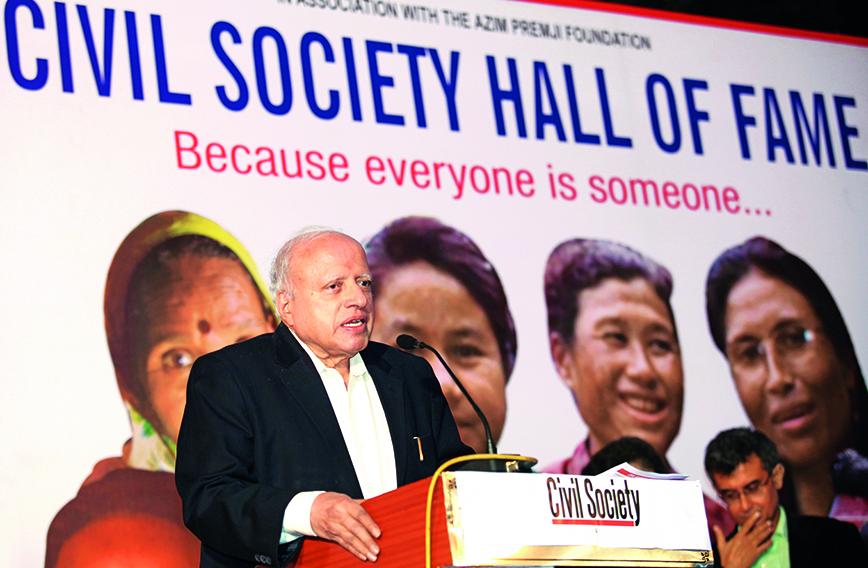
Scientist who saw the future in small farmers
Rita and Umesh Anand
IT was over a phone call that Dr M.S. Swaminathan agreed to be chief guest at our first Civil Society Hall of Fame event, which was held in 2011.
For all his eminence, he had the capacity to be spontaneous and excited about a new idea. You could say we hardly knew each other at that point. Our only previous interaction with him had been a lengthy and incredibly valuable interview he had given us. He was also a subscriber to our magazine.
From the archives: Our July 2010 interview with Dr MS Swaminathan
Having secured his acceptance, we wasted no time in sending off an email to formalize the invitation. But as the date of the event neared, and we were going crazy trying to get things organized, we received a phone call from Dr Swaminathan wondering if we could shift the time of the event around if not the date itself.
A terribly important official engagement involving some ministerial heavyweight had cropped up in his schedule. At first our hearts sank and then we responded in our own style, saying: “Dr Swaminathan, we can’t change anything at this stage, you will have to choose between the minister and us.”
He chose us, of course. He came to our event and stayed till the end. He engaged intensely and personally with each of the entrants to the Hall of Fame, who were from Meghalaya to Kerala to Rajasthan and elsewhere. He spoke illuminatingly about the importance of small efforts. He was generous and warm and went out of his way to make the Civil Society Hall of Fame in its inaugural avatar a success.
This is the Dr Swaminathan we knew in Civil Society. Even at the age of 80, he was sprightly and purposeful. Though an insider to influential circles in the country, he understood and respected those who belonged in the fringes — changemakers from afar, small farmers or a fledgling magazine like ours was then.
He was a scientist ahead of his time. Even as he helmed the Green Revolution to save India from hunger and external dependence, he cautioned against its downsides: pesticide dependence, groundwater overuse and escalating input costs.
His voluminous report on Indian agriculture has gathered dust under successive governments, including the current BJP regime. But the report remains today the most influential and insightful document on reforming and strengthening the rural economy.
When new farm laws were rushed through Parliament and bitterly opposed by farmers, it was Dr Swaminathan who was remembered for his suggestions on compensating farmers adequately and making farming more viable for small farmers instead of abandoning them to the manipulation of powerful market forces. Corporations weren’t his answer to better farming. Empowering small farmers was, as also making farming sustainable and protecting biodiversity.
He was clear that the small farmer should be the focus of an agricultural/food policy. At the time the right to food bill was being drafted, he welcomed the shift to a rights-based approach but pointed out the mere handing out of foodgrains would not achieve much. A law would have to “look at the totality of what needs to be done”.
He said to us in his interview: “So the first step in food security is to improve the productivity and prosperity of small-farm agriculture. Only then will small farmers have money to buy a balanced diet. We have three components of food security. First, availability of food in the market, which is a function of production and that means enhancing the productivity of small farms, dryland farms. Secondly, absorption of food in the body, which is a function of safe, clean drinking water, sanitation, primary health care. And thirdly, access to food, which is a function of purchasing power or jobs. With food inflation being high, money is important for food security. Food security therefore means availability, access and absorption. These three are critical.”
He emphasized that it was important to compensate farmers adequately for what they produced. Unlike in Europe or America, 60 percent of Indians remained engaged in agriculture. They were producers and consumers too.
He saw the food security law as an opportunity for India to escape from the stigma of malnutrition, maternal deaths and low-weight babies.
What India would do in agriculture would be inextricably linked to its status as an economic power to reckon with.
“The future belongs to nations who have grains, not guns. Guns you can purchase, grains you cannot,” he said.
Dr Swaminathan believed scientists needed to be among farmers in their fields. Higher food output could not be achieved by scientists alone. They needed to engage with and motivate farmers. He recalled there were farmers he worked with closely and on whose plots field trials were conducted for different varieties. But now those very fields were gone. “They have become shopping malls,” he told us regretfully.
Comments
Currently there are no Comments. Be first to write a comment!



